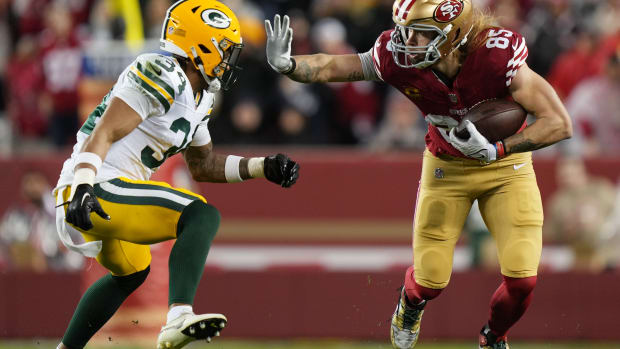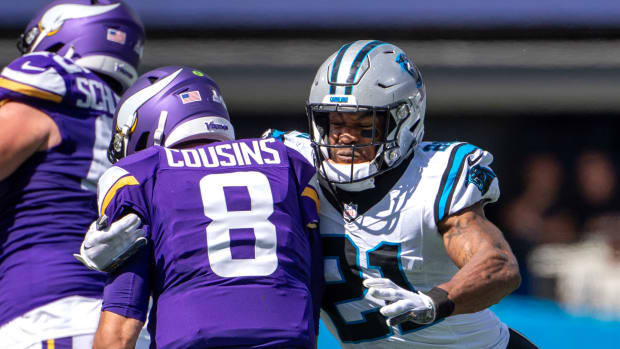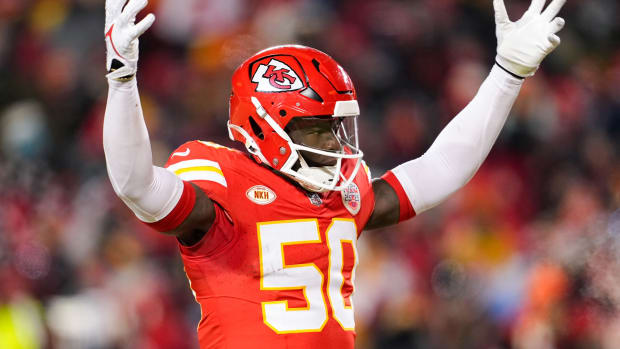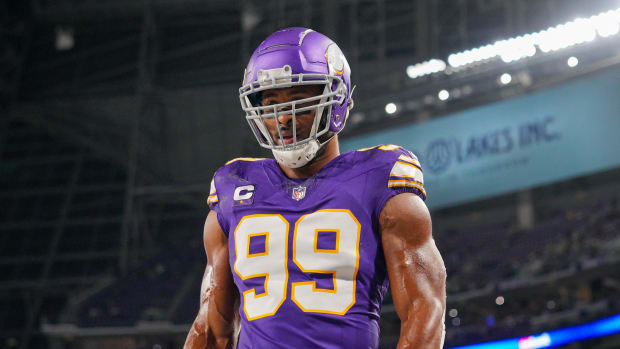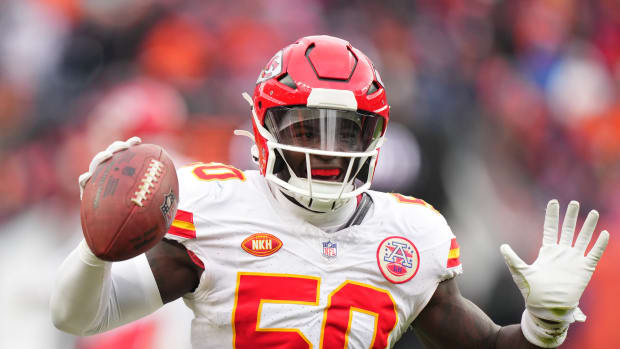Why Kirk Cousins to the Vikings Makes the Most Sense (and Why the Browns Should Steer Clear)
Most NFL coaches agree: Kirk Cousins is a system quarterback. A high-level system QB, sure, but a system QB nonetheless. In other words, Cousins is not someone you build around—he’s someone you plug in. His arm is good, not great. Same goes for his athleticism. His pocket mobility and toughness have improved each year, which is notable given that most NFL systems center around traditional dropback passing. When playing on-script, Cousins is efficient. But off script, he can be erratic.
Coaches, especially those on ready-to-win-now teams, don’t love drafting and developing a system QB. It takes more work than potential star QBs, but it often comes at the same level of risk (a first-round pick) and with the same worst-case scenario (a bust). Signing a system QB is different. Those are ready-made products and known entities. Every coach believes his system is so great that all he needs is someone who can execute it properly.
Cousins’s scouting report might be lukewarm, but it’s more than enough to make him the highest-paid man in NFL history. It’s simple supply and demand. Every year there are anywhere from a half dozen to a baker’s dozen teams needing a quarterback. It takes only two for a bidding war. And high-quality quarterbacks are exceedingly rare on the open market—especially QBs under the age of 30 who are healthy and coming off three full seasons as an NFL starter, like Cousins.
The bidding war for Cousins will reach even greater heights because this year’s crop of quarterback-needy teams is uncommonly strong, either financially or competitively. Teams with an immediate QB need are: Cleveland; New York Jets; Arizona; Buffalo; Denver; Minnesota; and Jacksonville (though Blake Bortles’s retention is likely).
The Browns and Jets have approximately $110M and $79M in cap space, respectively. The Cardinals and Bills can see themselves as a QB away from being of serious playoff-caliber. The Broncos, Jaguars and Vikings, with three of the league’s most talented defenses, can see themselves as a QB away from Super Bowl-caliber.
In the NFL, if you’re one piece away from Super Bowl contention, almost no price is too high for that piece—especially if not having that piece could mean a seven- to nine-loss season. If you’re not willing to spend hugely for a QB under these circumstances, then what’s the point of anything? Football is about winning titles.
This has always been Broncos czar John Elway’s perspective, which is why he’s expected to be at the forefront of the Cousins bidding. Elway did the same thing with Peyton Manning in 2012. Since Manning’s retirement after a 2015 Super Bowl title, Denver has gone 9-7 and 5-11 despite still having one of the league’s most dynamic defenses. Now that defense’s window is starting to close—if it hasn’t already. The Broncos are projected to have around $26M in cap space. Elway has employed clever accounting to create cap space before; he’d have to again, because signing Cousins is less attractive if it requires sacrificing parts of that Super Bowl-ready D. Cornerback Aqib Talib ($12M cap hit) and defensive lineman Derek Wolfe ($10.7M) have been floated as possible cap casualties.
• HUGE PAYDAY FOR COUSINS? NOT SO FAST: Andrew Brandt with a contrarian view on Cousins’ market
The Vikings, on the other hand, have an even stingier defense than Denver, plus enough cap room—$53M—to add Cousins without making cuts. They also have a better offensive cast than Denver. New offensive coordinator John DeFilippo recently sang Cousins’s praises. With Mike Zimmer calling the defense, DeFilippo, who was great as a schemer when coordinating an untalented Browns offense in 2015, and fantastic as a QB teacher with the Eagles in 2016-17, will presumably be the de facto offensive head coach.
DeFilippo is sharp at beating anticipated coverages through design, and he’s a fan of a quick dropback passing game. His system is a strong fit for Cousins, especially given the cast it would come with: two fundamentally pristine receivers in Adam Thielen and Stefon Diggs, and an explosive running back in Dalvin Cook. The only thing the Vikings don’t have is a clear mismatch-making movable weapon in the passing game, the kind Cousins had in Washington with running back Chris Thompson and especially tight end Jordan Reed. But with no glaring holes on either side of the ball, the Vikings can invest a midround pick or two in hopes of finding this year’s Alvin Kamara.
Cousins and the Vikings have not been strongly linked, but only because the focus with Minnesota has been on whether they’ll re-sign Case Keenum, Sam Bradford or Teddy Bridgewater. But DeFilippo, who deserves (though, granted, may not have), a say in the QB decision, has no ties to any of those three. Plus, they all come with concerns. Keenum was great—truly great—last season, but he’d been a mid-level backup in his previous five seasons. With his marriage to Pat Shurmur now over, will he fall back to Earth? Bradford simply can’t stay healthy. And Bridgewater, even though not everyone within the Vikings organization admits it, has arm-strength limitations. He also hasn’t played in two years.
With Cousins, there are no questions. But while that’s precisely why signing him makes sense for the Vikings, it’s also why it doesn’t make sense for the Browns. We know what Cousins is, and it’s not enough to haul a downtrodden franchise over the hump. Hue Jackson, who replaced Cousins’ old coach Jay Gruden as Cincinnati’s offensive coordinator in 2014, would surely want Cousins because it means the third-year head coach could run his full system, unabridged. And, though Jackson would never describe it like this, he needs someone who can immediately get the Browns to 5-11 or 6-10. Anything short of that makes it easy for owner Jimmy Haslam to greenlight Jackson’s firing.
That firing would technically come from new GM John Dorsey, who, unlike Jackson, has time to spare. Dorsey also has two of the top four picks in a draft that projects to have at least four quarterbacks go early in the first round. If you’re in a long-term rebuilding project, why grossly overpay for a solid veteran QB when you can underpay for a potentially great developmental one? Especially when getting Cousins would not ensure newfound success. The Browns might not be as bad as people think, but 0-16 can’t be achieved without having more than a few depth-chart deficiencies. Remember, Cousins is not someone you build around. He’s someone you plug in.
A WORTHY ALTERNATIVE TO COUSINS?
Josh McCown is 38 but has shown no sign of decline. In fact, 2017 was his most impressive season. McCown was excellent on a Jets offense that had few weapons and a subpar O-line. He’s a cerebral veteran QB who plays on schedule and within his strengths. He can be had for a fraction of Cousins’ price. If the Vikings plugged in McCown and used the savings to get another playmaker or two, they’d remain Super Bowl contenders. The problem is, playmakers are in short supply in free agency this year. There are a bunch of plug-in options, but not many men who can bring a new dimension to an offense or defense.
TWEET ELABORATION
I’m not saying McCarron can’t play. But tacitly, the Bengals have. They sat McCarron behind Andy Dalton, a QB whom the coaches like personally but don’t love professionally. The assumption that McCarron could be this year’s Jimmy Garoppolo is apples and oranges. Garoppolo was a second-round pick who rode the bench behind the greatest QB of all time. And when Garoppolo did play, the Patriots did not scale back much of their offense. When McCarron filled in for an injured Dalton in Week 14-17 (plus the wild-card game) in 2015, the Bengals certainly scaled back their offense. Most likely, McCarron is this year’s Mike Glennon—a quality backup who will garner short-term starter money. Good for him, he needs to bank as much as possible. And he must be willing to base his decision on money, not playing time. With multiple free-agent QBs and a rich draft class, it’s highly unlikely any of the league’s QB-needy teams will invest solely in McCarron long-term. If he signs somewhere and finds himself facing another second-string role later (like Glennon in Chicago), 2018 could be his only chance at big money.
WHY REICH TO INDY MADE SENSE
All Frank Reich needed to tell Colts owner Jim Irsay and GM Chris Ballard in his job interview was this: The last two years, I’ve coached the one QB in the world who is similar to Andrew Luck. We had great success with that guy running a quick-strike scheme in 2016 and even greater success with a deep-dropback scheme in 2017. I am uniquely qualified to deliver with whatever approach Luck (and his shoulder) need in 2018.
NONFOOTBALL THING ON MY MIND
It takes a special kind of laziness to stand on an airport’s moving walkway. In fact, given that everyone who does so has either just sat, or is about to sit, on a long plane ride, it’s downright pathetic. Standing on a moving walkway should be outlawed. Those walkways are resources, not kiddy carnival rides. Replace “stand to the right, walk to the left” with “walk to the right, walk faster to the left.” The only people who should ever stand are the people who already ride the speedy, high-pitched beeping airport carts.
Question or comment? Email us at talkback@themmqb.com.


































